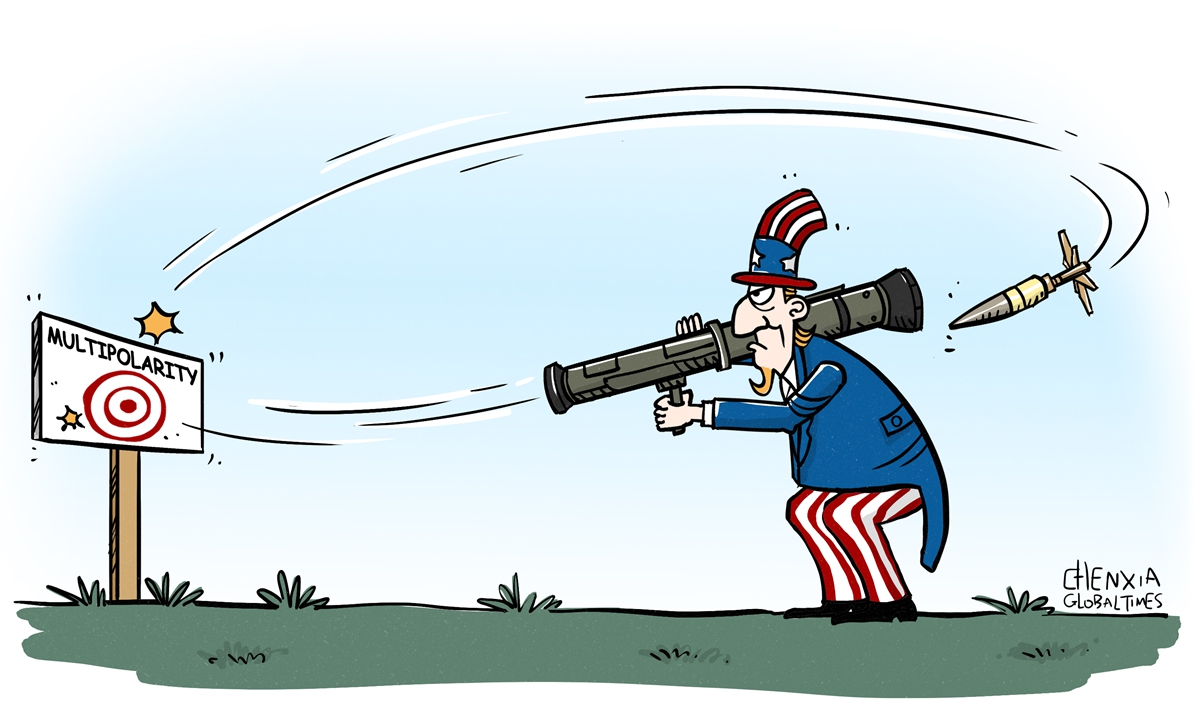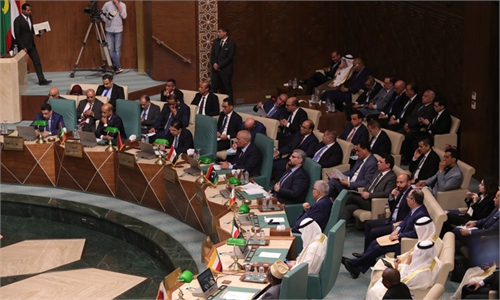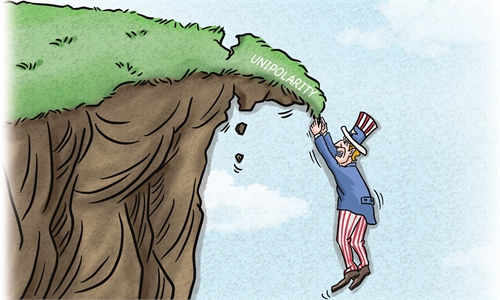
Illustration: Chen Xia/GT
China is framed in the West as a "revisionist power" intent on overthrowing the "rules-based international order" and replacing it with something else - "China's world order." This way of interpreting the issue is misleading. What's happening isn't a contest between separate, ideologically articulated conceptions of international order. The issue is the US' inability to adjust to the end of its unipolar era.
The world is already multipolar. The only place unipolarity exists unchallenged is in the political culture of the United States and its most captive vassals. The problem is not whether unipolarity can be defended against China, but whether the US elite can descend safely from its delusion.
Unipolarity has had a very short life. It became US doctrine only after the end of the Cold War, when in 1992, George H. W. Bush's administration asserted in a strategy document that "America's political and military mission in the post-cold-war era will be to insure that no rival superpower is allowed to emerge." This claim to power is wedded to the ideology of liberalism. US primacy was declared to be "essential to the future of freedom."
Unipolarity was a rollback of the equal sovereignty of all nations envisioned by the UN Charter. It replaced collective internationalism with US unilateralism and international law with the so-called "rules-based order," a vague euphemism for the super-sovereign status of the US. It is the US that is the revisionist power relative to the post-World War II international order, while it is the non-Western world that seeks a restoration of that order.
The unipolar era was hastened to its end, not by enemies, but by the recklessness of the neoconservative policy program. The Neocons continue to drive US policy.
The economic vehicle of unipolarity, neoliberal globalization, collapsed in the Global Financial Crisis of 2008 and has been sustained without reform by money printing and debt creation.
Global manufacturing, trade, diplomacy and culture are already multipolar. This year, Beijing has emerged as the center of global diplomacy. The US cannot dominate Russia or China militarily despite having surrounded them with military bases.
Liberalism, the ideology of a unipolar empire, has lost the legitimacy it once had around the world. Western countries' internal and international response to the COVID crisis was a disappointment. Meanwhile, China's development has demonstrated that there are other non-Western routes to modernity.
Permanent war and financialization have also eroded the internal legitimacy of the Western elite and its ideology. Trust in Western leaders and institutional media is at an all-time low. The rise of political populism is a sign that the liberalism that buttressed the empire's claim to primacy is no longer "unipolar" even at home. Its rhetoric is worn, its ideology is exhausted, and its legitimacy is questioned.
The world is already multipolar. The "multipolarist" effort to give it shape through institutional collaboration is practical, not ideological. It aims to build the practical ability to resist US coercion. As the US weaponizes every economic relationship, institution, instrument and technology, it has become necessary for any state intent on preserving its sovereignty to find alternatives. The most abused of these dependencies is the dominance of the US dollar.
The liberal ideology of unipolarity is inherently unipolar and extremist. It recognizes only its own legitimacy. Any other form of government is tagged for eventual regime change as an "autocracy." In contrast, multipolar resistance seeks only the restoration of sovereign equality and the "democracy between nations" promised in the UN Charter.
The US leads an ideologically, financially and militarily allied West. The non-Western world, whether in BRICS, ASEAN, the SCO or the African Union, is not organized under any ideological banner. These organizations are designed to protect and enhance their member states' sovereignty and freedom of action and as platforms for multilateral cooperation for trade, development and security. They are not alliances against any other power.
Unipolarity has been the Dutch Disease of US foreign policy. Under unipolar order, the only restraint is self-restraint, which the US has never been good at. The fact that the US could do what it wanted to whomever it wanted is celebrated as freedom. In seeing coercive violence as the solution to every problem, US diplomacy has atrophied, and its worldview narrowed. Its political elite has grown more ineffectual, narcissistic and ideological. Today they navigate by a map of the world and a sense of superiority made in 1991 and are enraged when reality fails to conform. Even as their wars and sanctions backfire, they double down with ever more self-destructive plans. In resisting multipolarity, the US is ultimately waging war on reality.
The author is a former Malaysian government official and a senior research fellow at Perak Academy, Malaysia. This is the fourth piece of the "Quest for multipolarity" series. opinion@globaltimes.com.cn


